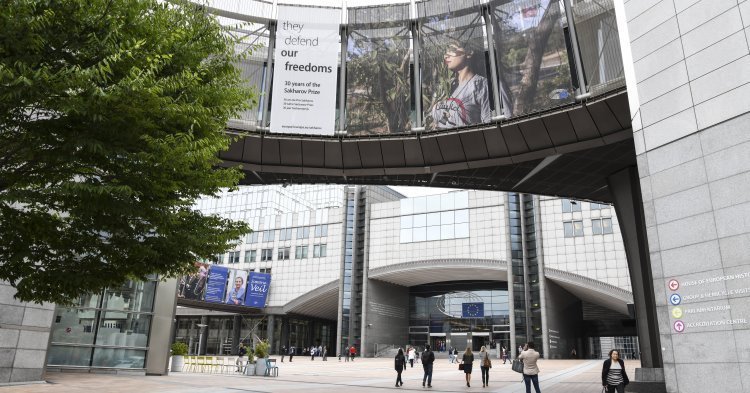The Sakharov Prize for Freedom of Thought was created in 1988, in honour of Andrei Sakharov, Soviet physician who participated in the research and conception of the first Soviet hydrogen bomb during the Cold War. Conscious of the danger represented by this bomb, in the hands of a booming Soviet military-industrial complex, Andrei Sakharov developed a critical attitude towards the USSR government. Before being compelled to “internal exile”, he continually denounced the one-party regime and its corrupt bureaucracy, the social injustice, the repression and the non-respect of human rights.
Respect for human rights: a founding value of the European Union
Respect for human rights is one of the founding values of the European Union. Through the Sakharov Prize created by the European Parliament, the European Union wishes to support the persons committed to the defence of these fundamental rights. Regardless of nationality, this prize awards citizens or NGOs which have been exceptionally and courageously engaged against human rights violations.
The President of the European Parliament, Antonio Tajani, said during the ceremony at the European Parliament in Strasbourg on 12 December:
“Oleg Sentsov was nominated for his peaceful protest against the illegal occupation of his native Crimea. Also for his courage, determination and his convictions in support of human dignity, democracy, the rule of law and human rights; these are the values on which our Union is built, (…) values that this Parliament cherishes, upholds and promotes. Sentsov’s hunger strike and courageous public stance made him a symbol of the struggle for the release of political prisoners held in Russia and around the world. The Sakharov Prize is not only an award. It is a commitment. And we keep standing close by our laureates.”
What hope for Oleg Sentsov?
Oleg Sentsov is a 42-year-old Ukrainian filmmaker and scriptwriter. In 2013, he became a member of the socio-political movement AutoMaidan in which he’s been fighting for freedom, human rights and peace in Ukraine. However, his role during the annexation of Crimea led to his arrest by the FSB (the Federal Security Service of Russia). He was then brought to Russia. Oleg Sentsov appeared before a military tribunal for having organised humanitarian missions helping Ukrainian soldiers, bringing them food and medicine, while participating in their families’ evacuation. He was then sentenced to twenty years in prison.
In 2018, Oleg Sentsov went on a hunger strike for 145 days to demand the release of 70 Ukrainian political prisoners detained in Russia. Unsuccessfully, he gave up under the threat of being force-fed. Despite the mobilisation of artists, intellectuals and politicians across the world, the position of Moscow is not foreseen to evolve. Indeed, Oleg Sentsov, unilaterally naturalised as Russian by the Russian authorities, is accused of “terrorism” and “arms trafficking”. According the official discourse, why should a man convicted of terrorism be released?
In October 2018, Oleg Sentsov was declared a honorary citizen of the City of Paris. The European Parliament then paid tribute to him with the Sakharov Prize. As the 2018 laureate could not leave the penal colony of Labytnangi to receive his prize on 12 December in Strasbourg, his cousin Natalya Kaplan attended on his behalf.
The Russian government seemed to remain inflexible regarding the prisoner Oleg Sentsov, and his upcoming release is highly unlikely. Can honorary titles change the Russian decision? Or do they only allow for the Western democracies to have a clear conscience without exerting a real political and economic pressure on Russia? Do we expect the European Union to impose its values beyond its borders?


Follow the comments: |
|
